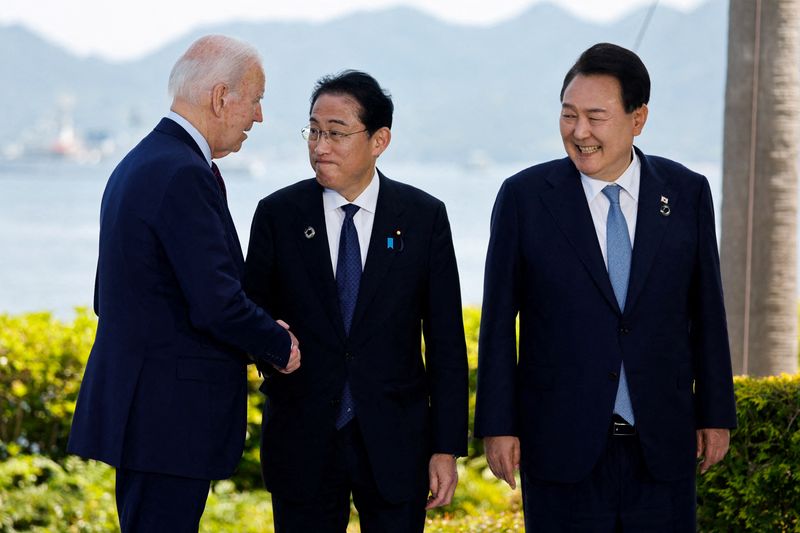US, South Korea and Japan to agree to crisis consultations at Camp David summit
2023.08.18 05:29
2/2

© Reuters. U.S. President Joe Biden, Japan’s Prime Minister Fumio Kishida and South Korea’s President Yoon Suk Yeol attend a photo op on the day of trilateral engagement during the G7 Summit at the Grand Prince Hotel in Hiroshima, Japan, May 21, 2023. REUTERS/Jo
2/2
By Trevor Hunnicutt and David Brunnstrom
HAGERSTOWN, Maryland (Reuters) – At a Camp David summit on Friday, the United States, South Korea and Japan will pledge to consult each other in moments of crisis, officials said, a commitment designed to deepen three-way military ties as the U.S. seeks to rally its allies to counter China’s rising influence.
The commitment, which falls short of a formal alliance, will be the centerpiece of U.S. President Joe Biden’s first Camp David summit for foreign leaders and represents a significant move for Seoul and Tokyo, which have a long history of mutual acrimony and distrust.
Biden is welcoming South Korean President Yoon Suk Yeol and Japanese Prime Minister Fumio Kishida to the mountainside presidential retreat on Friday, where they are expected to have several hours to strategize over how to manage tensions in the Indo-Pacific region and beyond.
The summit is expected to produce a series of joint statements, including commitments to establish a crisis hotline, work together on emerging technologies and to meet annually.
The event is also freighted with symbolism: with Washington’s encouragement, Tokyo and Seoul are navigating their way past disputes dating to Japan’s 1910-1945 occupation of the Korean Peninsula.
Those disputes are among the reasons the leaders would not now consider a mutual-defense pact along the lines of what the United States has separately with both South Korea and Japan, according to U.S. officials who declined to be identified while previewing the summit.
“What we have seen over the last couple of months is a breathtaking kind of diplomacy, that has been led by courageous leaders in both Japan and South Korea,” said Kurt Campbell, Biden’s coordinator for Indo-Pacific affairs.
“They have sometimes gone against the advice of their own counselors and staff and taken steps that elevate the Japan-South Korea relationship into a new plane,” Campbell said.
CHINA VIEWS SUMMIT WARILY
No specific action by the trio in Camp David is expected to sharply increase tensions with China, though Beijing has warned that U.S. efforts to strengthen ties with South Korea and Japan could “increase tension and confrontation in the region.”
While South Korea, Japan and the United States want to avoid provoking Beijing, China believes Washington is trying to isolate it diplomatically and encircle it militarily.
A senior U.S. official said at a briefing on the summit that the U.S. was not “centrally focused” on messaging to China, but the behavior of North Korea, China and Russia has “created incentives” for the allies to cooperate.
Tensions in the South China Sea have flared between U.S. ally the Philippines and China over a grounded warship that serves as a Philippine military outpost in the strategic waterway, a major global trade route.
Biden, an 80-year-old Democrat seeking another four-year term in the 2024 presidential election, faces a likely opponent in Republican former President Donald Trump, who has voiced skepticism about whether Washington benefits from its traditional military and economic alliances.
South Korea has legislative elections next year and Japan must hold one before October 2025, and what analysts see as a still fragile rapprochement between the two nations remains controversial among the countries’ voters.
The White House, conscious of the electoral clock, wants to make the progress between South Korea and Japan hard to reverse, including by establishing routine cooperation on military exercises, ballistic missile defense, the economy, and scientific and technological research.








